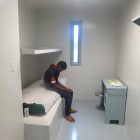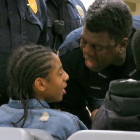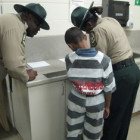
At ‘Wit’s End’: Scared Straight Programs Remain Popular Among Parents Despite Warnings
|
"...Scared straight, on average, has a harmful impact.”
Juvenile Justice Information Exchange (https://jjie.org/series/scaredstraight/)
Scared Straight programs, which take at-risk kids to jails in an attempt to frighten them out of a life of crime, are now part of the popular landscape of the U.S. The A&E Network hit ratings gold with its “Beyond Scared Straight” reality show and “Saturday Night Live” featured a series of skits spoofing the concept. But study after study have shown scared straight-type programs to be ineffective at best and counter-productive at worst, actually increasing the likelihood that a kid will one day enter the criminal justice system. So why do parents continue to place their kids in scared straight programs? For more than three years JJIE has provided extensive reporting on the issue. Read all of it below.

"...Scared straight, on average, has a harmful impact.”

A young writer asks, "...why is this television show, one that glorifies the abuse of young people... still on the air?

“Beyond Scared Straight” touts a program that does not work and demeans the very children Disney claims to shower with wholesome programing.

This week, the fourth season of the A&E TV show “Beyond Scared Straight” follows two young sisters to the adult jail in Douglas County, Ga. “We’ve got a real serious ethical program here,” said Professor Del Elliott, the founding director of the Center for the Study and Prevention of Violence at the University of Colorado Boulder. “We’ve got a TV production that’s promoting a program which is doing harm to our children.”

The controversial A&E Network series “Beyond Scared Straight” returns August 20 for a third season. If this 30-second teaser from A&E is any indication, viewers can expect more episodes filled with inmates and prison guards yelling at, verbally abusing and intimidating at-risk teens.

The “Beyond Scared Straight” message: “In prison for a day to stay out for life” certainly appeals to a television audience. The hit series from Disney’s A&E Network became the most watched original series launch in the network’s history with an audience of 3.7 million people. The show is a spin off of the multiple award-winning documentary films also produced by Arnold Shapiro.
But do “scared straight” programs really work to reduce juvenile crime? “No,” claimed Professor James Finckenauer, Ph.D., from Rutgers University School of Criminal Justice, in his address to the National Conference of Juvenile and Family Court Judges in New York City in July. Finckenauer, author of “Scared Straight! and the Panacea Phenomenon,” cogently explained why those programs don’t work by examining the concept of “deterrence” as applied to teenage thinking and behavior.

An Open Letter to
Robert A. Iger, President and Chief Executive Officer of the Walt Disney Company
Dear Mr. Iger:
I know Disney is a large company and you, like Rupert Murdoch of News Corporation, can’t oversee everything. So I want to let you know about one of your company’s investments -- Disney’s one-third equity stake in the A&E Television Networks. Since it is not fully under Disney’s control, maybe that’s why you haven’t been watching A&E’s "Beyond Scared Straight." Certainly if you had, you would have intervened and pulled it off the air, but alas last week marked the beginning of its second season.

Sheriff Chipp Bailey, of Mecklenburg County, N.C., has confirmed to JJIE his office received a $10,000 donation from the producers of “Beyond Scared Straight” following the appearance of the county’s “Reality Program” on the controversial A&E television show. Bailey said the money, provided by Arnold Shapiro Productions, would be used to offset the costs of the food and field trips that are part of the aftercare portion of the “Reality Program." It is unclear whether the producers have made similar payments to other programs filmed for “Beyond Scared Straight”. The “Reality Program” is designed, according to Bailey, to educate at-risk youth on the realities of prison life and help them avoid making decisions that would land them in jail. In the initial portion of the program, teens are brought to the county jail, and dressed in prison uniforms while deputies intimidate, yell at and berate them.

I just watched the first episode of this season of A&E’s “Beyond Scared Straight.” This was my first exposure to the show. JJIE.org has covered the details of this program and experts have weighed in about it in this space, from knowledgeable, yet slightly removed positions.
For me, however, it was a strange and personal experience. Watching the show I was flooded by memories of my own time in prison, both as a young man and as an older prisoner in contact with “at risk youth.” I felt waves of emotion, mostly negative, as I watched fear and intimidation used, along with a smattering of humane connection, to bring about change in these young people.
When I first arrived at the youth prison in Alto (a notorious prison at the time in north Georgia) in 1985, I was placed in a dorm. The officer told us that if we were fighting and refused to stop when he called “break,” he would “bust our ‘tater” with his billy club.

Set to air Thursday at 8 p.m., the premier episode of the new season of the controversial reality show, “Beyond Scared Straight,” adheres to the themes that made it A&E’s most watched show: A small group of at-risk youth spend the day in prison where they are yelled at, intimidated and humiliated by sheriff’s deputies and inmates alike. The screaming and threats of prison rape are followed by emotional conversations with the inmates as they describe to the teens where they went wrong and how the teens can avoid the same fate. The episode features Mecklenburg County, N.C.’s “Reality Program,” created by Sheriff Daniel “Chipp” Bailey. “Our Reality Program stresses education, not intimidation,” Bailey is quoted as saying on the program’s website. According to the website, the mission of the program is to “provide the community with a program which will help educate young people about the long-term effects of participating in criminal activity.”
After watching the show, non-violent communication and conflict management expert Dr. Heather Pincock was baffled.